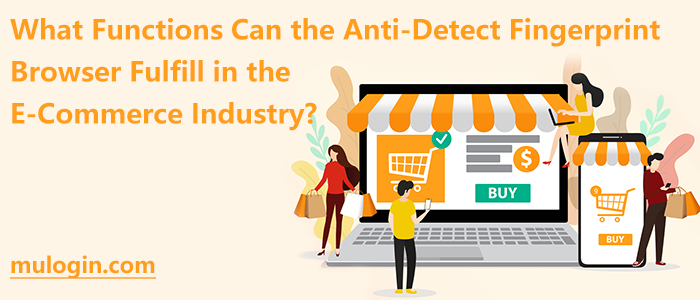Anti-fingerprint browsers play a crucial role in the e-commerce industry by helping to protect user privacy and provide better data security. Here is a detailed explanation of the role that anti-fingerprint browsers play in the e-commerce industry.
Part 1: Privacy Protection and Data Security
In the e-commerce industry, user privacy and data security are of utmost importance. Anti-fingerprint browsers can reduce the traces left by users on the internet, preventing trackers and advertisers from tracking their browsing behavior. By preventing personal information leakage, anti-fingerprint browsers help users protect their personal privacy and business secrets.
1. Tracker Blocking: Many e-commerce websites use trackers to collect users’ personal information and browsing habits for targeted advertising and personalized recommendations. Using an anti-fingerprint browser can block these trackers, avoiding personal information leakage and misuse.
2. Ad Blocker: E-commerce websites are filled with various advertisements, and some malicious ads can even threaten users’ devices and data security. Anti-fingerprint browsers come equipped with ad blockers that help users filter out unnecessary ads, reduce interference with user experience, and provide a safer browsing environment.
3. Encrypted Communication: Anti-fingerprint browsers use encryption technology to protect users’ communication data, ensuring the security of their interactions and payment processes on e-commerce websites. This helps prevent hacker attacks and data leaks, providing users with a safer e-commerce shopping experience.
Part 2: Price Comparison and Offers
E-commerce websites may adjust product prices or provide personalized offers based on user’s browsing history and other behaviors. Using an anti-fingerprint browser can avoid being identified and influencing pricing, thereby providing objective price comparison and offer analysis.
1. Concealing Real Identity: E-commerce websites typically identify users’ identities through their IP addresses, browsing history, and other data. Anti-fingerprint browsers can simulate different IP addresses and browsing behaviors, thus concealing users’ real identities and avoiding being recognized by e-commerce websites that may adjust prices and offer accordingly.
2. Objective Price Comparison: With an anti-fingerprint browser, users can access the same e-commerce website under different browsing identities, obtaining different pricing and offer information. This allows users to make objective price comparisons, find the most suitable products and offers, and avoid being influenced by personalized pricing.
Part 3: Market Research and Competitive Analysis
In the e-commerce industry, understanding competitors’ products and marketing strategies is crucial for gaining a competitive advantage. Using an anti-fingerprint browser can hide real identities and browsing behaviors, preventing competitors from tracking and monitoring users.
1. Anonymous Market Research: By using an anti-fingerprint browser to access competitors’ e-commerce websites under different identities, users can gather information about their competitors, such as product pricing and promotional strategies. This helps conduct anonymous market research and better understand market demand and competition.
2. Avoiding Competitor Monitoring: Competitors may track and monitor user behavior on e-commerce websites. By using an anti-fingerprint browser, users can avoid being tracked and monitored, protecting their business strategies and maintaining a competitive edge.
Part 4: Advertising Analysis and Optimization
In the e-commerce industry, advertising plays a crucial role in attracting customers and driving sales. Anti-fingerprint browsers can prevent advertisers from targeting users with precise advertisements, thus avoiding interference and biases in ad placements. This, in turn, helps e-commerce practitioners analyze and optimize their advertising strategies more effectively.
1. Ad Blocking: Anti-fingerprint browsers come equipped with ad-blocking capabilities, filtering out irrelevant or malicious ads and providing a better browsing environment for advertisements.
2. Ad Analysis: By hiding the user’s true identity, anti-fingerprint browsers allow e-commerce practitioners to anonymously view advertisements, gaining insights into their competitors’ advertising strategies and effectiveness. This helps improve ad analysis, refine ad placement strategies, and optimize ad performance.
Part 5: Global Market Expansion
The e-commerce industry has a global nature, and anti-fingerprint browsers can simulate different geographical locations and IP addresses, aiding e-commerce practitioners in understanding and adapting to the needs of different markets, thus expanding their global business.
1. Geographical Location Simulation: By changing IP addresses and browsing behaviors, anti-fingerprint browsers can simulate different geographical locations. E-commerce practitioners can utilize this feature to observe and analyze market trends and user behaviors in specific regions, providing better decision-making for global business expansion.
2. Anti-Fraud Protection: Anti-fingerprint browsers can help e-commerce practitioners prevent fraudulent transactions and activities. By simulating different geographical locations and browsing behaviors, potential fraud activities can be identified and blocked, thus enhancing transaction security and reliability.
Anti-detect fingerprint browsers play a multifaceted role in the e-commerce industry. They protect user privacy and data security, provide anonymous browsing, reduce ad interference, offer objective price comparison and deal analysis, support market research and competitive analysis, optimize ad placements, enhance business performance, and aid in global market expansion. Through the use of anti-fingerprint browsers, e-commerce practitioners can better respond to competition, improve user experiences, and achieve better business outcomes.
MuLogin Anti-detect Browser supports batch account management for various platforms like Amazon, Facebook, Shopify, PayPal, eBay, and more. It allows cookie import/export, enables automatic login for accounts, and supports multi-user collaboration and sharing. Simulating target locations and device hardware fingerprints through different configurations such as IP, time zone, and device information facilitates operations like bulk registration, login, multi-account usage, and account nurturing. With its account protection features, MuLogin provides convenient and efficient operations.
MuLogin also supports multi-user simultaneous management of operational accounts. If the administrator assigns account batches to other users, they can manage and operate those accounts. Administrators can also set usage permissions for each user, greatly improving team collaboration efficiency.
